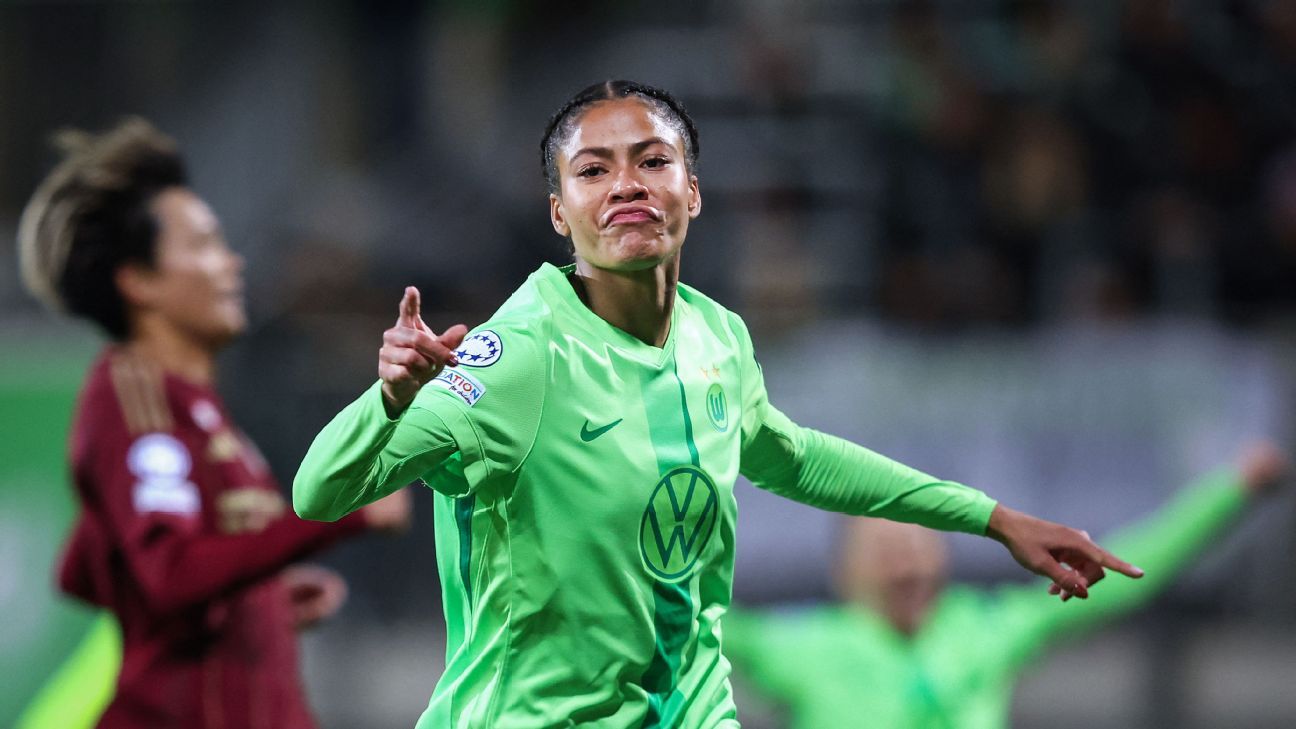Dec 13, 2024, 04:30 AM ETSveindís Jane Jónsdóttir scored four goals for Wolfsburg to cement their place in the next round. RONNY HARTMANN/AFP via Getty Images
Matchday five of this season’s UEFA Women’s Champions League saw the last remaining places in the knockout phase filled.
Wolfsburg saw off Roma 6-1 and Barcelona beat Hammarby 3-0 in the only two games with anything riding on them. The rest was quite predictable as Lyon thrashed Galatasaray 6-0, Chelsea battered FC Twente 6-1, Bayern Munich overcame Juventus 4-0 and Real Madrid saw off Celtic 3-0. Elsewhere, Arsenal took down a spirited Valerenga 3-1, while Manchester City eased past St. Pölten 2-0.
We asked our writers Emily Keogh, Sophie Lawson and Sam Marsden to answer some of our burning questions.
How bad is it that all eight quarterfinalists have already been decided with one game left?
Keogh: This season, the group stage has felt disappointingly predictable. Aside from the intriguing match-up between Roma and Wolfsburg, the quarterfinalists were almost exactly as expected when the draw was made back in September. This predictability has further highlighted the growing disparity between leagues and clubs, which has diminished the excitement and competitiveness of the tournament.
As a result, for me, the group stage has lacked the unpredictability that typically makes these games so engaging for fans. Another concerning trend has been the noticeable drop in attendance for the penultimate matches. With very little at stake in many of the games, it’s easy to understand why fans might feel less inclined to turn up.
Editor’s Picks
2 Related
Lawson: It’s not good. When the group-stage draw was made, it did look likely that we’d be heading for polarised groups with the main tussle set to be between Wolfsburg and Roma. And although Roma did snatch a win in their first meeting with the She Wolves, their collapse on Wednesday made for dismal viewing.
It is important to not just focus on the standings because you can lose some of the drama and interest that’s been doled out in 90-minute increments this season. From Manchester City needing to come from behind against St. Pölten to win 3-2, the week after they stunned Barcelona, to Chelsea’s uncomfortable night at Celtic Park last month, tireless Hammarby and, of course, Vålerenga fearlessly wanting to go out and attack every team they faced.
Overall, we have had some joy and upsets within the current format but this is also the last season before the switch to UEFA’s Swiss model (to align with the men’s Champions League) for 2025-26. With the specific way this group stage has played out, that might be something players and fans alike are thankful for.
Marsden: It’s bad. This season’s group stage has been too predictable, with Wolfsburg the only team of the eight going through that have had to sweat a little bit. Even then, they sealed progress by smashing their direct opponent for qualification, Roma, 6-1 this week.
In fact, all the results this week speak of the gap between the best and the rest: All eight teams going through to the quarterfinals won their games by at least two goals. It’s in stark contrast to last season, when teams like Bayern Munich and Real Madrid crashed out, while Ajax, Hacken and Brann progressed. Maybe the Swiss model will restore some balance when it’s introduced next year.
With respect to Hammarby, Wolfsburg vs. Roma was the only game with anything actually riding on it. What caught your eye from that one?
Roma are not the force they once were. Fabio Rossi/AS Roma via Getty Images
Lawson: Sveindís Jane Jónsdóttir scored a minute after coming on in the 67th minute and then proceeded to dismantle Roma as she smashed in another three goals. Having missed the first half of last season with an Achilles injury, it’s fair to say the Iceland international had been struggling for form and it’s taken her a little while to start looking sharp again.
Wolfsburg just looked better from the first kick of the game, heaping early pressure on Camelia Ceasar‘s goal. And, after losing pace in the Frauen-Bundesliga title race over the weekend, it was exactly the type of performance they needed to get the blood pumping.
But if it was a statement win for Wolfsburg, it was a statement loss for Roma who have laboured this season. Two seasons ago, Alessandro Spugna’s side made a commitment to playing exciting, flowing football and it won them back-to-back Serie A titles. But this team looks nothing like that one and the mistakes they make are so basic — the high line they were playing in Germany was unfathomable. They’ve lost that smooth, interchangeable attack and it’s sad to see how far they’ve fallen.
STREAM FUTBOL W ON ESPN+
Ali Krieger and Sebastian Salazar debate the biggest storylines and break down the best highlights from women’s soccer in the Americas. Stream on ESPN+ (U.S. only)
Marsden: Several things. The way Roma imploded after equalising early in the second half. Wolfsburg always had the edge at home but, after losing 1-0 in the reverse fixture, I did not anticipate such a mauling. That said, there is far more talent and experience in the German side’s squad. Alexandra Popp ticks both of those boxes and her opening goal was brilliant. Of course, substitute Sveindís’ four-goal haul in 25 minutes on the pitch was also sensational.
Keogh: There was a striking contrast in approach and ability to deliver under pressure. It highlighted a clear disparity in experience and composure between the two sides when the stakes were highest. Roma, while an exciting and promising team, are still relatively new to this level of competition, having only participated in the tournament twice before. Their lack of deep European experience showed at a critical moment, as they struggled to find the resolve needed to close out the decisive game.
On the other hand, Wolfsburg exemplified the poise and approach that come with being a seasoned contender on the European stage. As former winners with a storied history in the Champions League, Wolfsburg have built a reputation for knowing how to navigate high-pressure situations. Their ability to pull out all the stops and maintain their composure when the match went down to the wire was a testament to their pedigree.
Which of the teams that didn’t get through could make a better run next year?
Vålerenga have shown something this year and could be back again. Marius Simensen – UEFA/UEFA via Getty Images
Keogh: I expect Juventus to come back stronger next season, especially after falling short this year despite their promising start. Their victory over Paris Saint-Germain in the qualifiers suggested they had the potential to compete with the best, but they struggled to truly challenge Bayern Munich and Arsenal in the group stage. With their resources, ambition, and growing experience on the European stage, Juve will undoubtedly aim to bridge the gap and make a deeper impact in the competition next season.
I’d love to see Celtic back in the competition next season, building on the positives from this season, despite failing to gain a point this time around. And I’m also eager to see the potential return of several other clubs like Benfica, Frankfurt, Häcken, and Ajax, all of whom failed to progress beyond the qualifiers this season but bring a lot to the table in terms of excitement and variety. Each of these teams has the potential to contribute to the unpredictability and competitiveness of the Champions League, qualities that felt somewhat lacking in this year’s edition.
Lawson: As we saw with Brann and Häcken last season, it can be hard to sustain growth when you’re on the fringes in Europe, but I’d love to see Vålerenga back next year. They deserve something for their pluckiness but will likely face similar hurdles to Hammarby and may not be able to hold on to their best players.
There should also be a better showing from a few who fell in the qualification stages, like Benfica, who had been finding their feet in Europe over the last few years, Paris FC, who took out some big guns last season, and Eintracht Frankfurt.
Marsden: It’s hard to look at any of the eight teams heading out and say with any conviction they will do better next season. Juventus are one team that could improve. They are dominant in Italy this season so far and a favourable draw in the Swiss model could help them squeeze into the knockout rounds. Perhaps it will be a team that did not make the group stage this season, though, in PSG, who come back stronger next year.
Which game from the final round of matches will you be watching, if any?
Marsden: Barcelona hosting Manchester City, for various reasons. Firstly, because I think both teams will be desperate to come top of the group to potentially delay having to face Lyon or Chelsea. All eight quarterfinalists are strong, but they, along with Barça, are the strongest. Secondly, because Barça are out for revenge after losing to City in the first group game this season. And thirdly, because it will be played at the 50,000-capacity Olympic Stadium in Montjuïc. Barça have played all their home games so far this campaign at the 6,000-capacity Estadi Johan Cruyff. Their fans tend to lift it when they move to bigger stadiums, previously Camp Nou, but more recently the Olympic Stadium while Camp Nou is redeveloped.
Keogh: After the much-discussed location controversy following the move to Meadow Park from the Emirates, Arsenal vs. Bayern Munich is an attractive option. This fixture promises to be thrilling, especially considering the explosive nature of the reverse fixture, which ended in a dramatic 5-2 scoreline and featured a sensational hat trick from Pernille Harder.
Lawson: A relentless glutton for punishment, I’ll be watching all of the games from the last matchday. But, as it’s first vs. second and third vs. fourth, we should have a good selection of games across all the groups especially as teams grapple for top spot, so we get Barcelona looking for a little revenge against Manchester City and the Renée Slegers’ version of Arsenal squaring off against Bayern. With Twente vs. Celtic, Juventus vs. Vålerenga and St. Pölten vs. Hammarby, you’ve got six teams who’ll all want to go out on a high, showing how much they’ve taken from this group stage and trying to end the calendar year with a win.
Finally, even though the Group A standings are set, we are set for the 10th Champions League meeting between Lyon and Wolfsburg — a final we’ve seen four times in UWCL history — but one that has been painfully one-sided since that first meeting in 2013. Wolfsburg have only won once, in 2017, and even then the 1-0 win wasn’t enough to go through on aggregate. In that time, Lyon have written their name in the women’s football history as one of the greatest teams ever.







